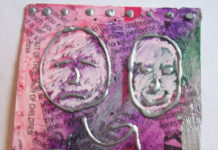Things Your Doctor Should Tell You About Antidepressants
The conventional wisdom is that antidepressant medications are effective and safe. However, the scientific literature shows that the conventional wisdom is flawed. While all prescription medications have side effects, antidepressant medications appear to do more harm than good as treatments for depression.
The Door to a Revolution in Psychiatry Cracks Open
The Ministry of Health in Norway has ordered its four regional health authorities to offer medicine-free treatment in psychiatric hospitals. A six-bed ward in Tromso, which is in the far north of Norway, is now providing such care.
Stopping SSRI Antidepressants Can Cause Long, Intense Withdrawal Problems
In the first systematic review of withdrawal problems that patients experience when trying to get off SSRI antidepressant medications, researchers found that withdrawing from SSRIs was comparable to trying to quit addictive benzodiazepines.
How to Avoid Severe SSRI Withdrawal Symptoms?
After long-term use, most people are going to have serious symptoms when stopping SSRIs. Many people are going to have transient, mild to moderate difficulty and some are going to end up falling down the akathisia rabbit hole. That is a long, difficult drop.
Percentage of Americans on Antidepressants Nearly Doubles
From 1999 to 2012 the percentage of Americans on antidepressants increased from 6.8% to 13%, according to a report published this week by the...
Do Antidepressants Work? A People’s Review of the Evidence
After a meta-analysis of RCTs of antidepressants was published in Lancet, psychiatry stated that it proved that "antidepressants" work. However, effectiveness studies of real-world patients reveal the opposite: the medications increase the likelihood that patients will become chronically depressed, and disabled by the disorder.
MIA Survey: Ex-patients Tell of Force, Trauma and Sexual Abuse in America’s Mental Hospitals
In a MIA survey of people who had been patients in mental hospitals, nearly 500 respondents told of an experience that was often traumatic, and frequently characterized by a violation of their legal rights, forced treatment with drugs, and physical or sexual abuse. Only 17% said they were “satisfied” with the “quality of the psychiatric treatment” they received.
Psychiatry Defends Its Antipsychotics: A Case Study of Institutional Corruption
Jeffrey LIeberman and colleagues have published a paper in the American Journal of Psychiatry stating that there is no evidence that psychiatric drugs cause long-term harm, and that the evidence shows that these drugs provide a great benefit to patients. A close examination of their review reveals that it is a classic example of institutional corruption, which was meant to protect guild interests.
Benzo Withdrawal: Why Don’t Doctors Know?
Many have asked: “Why doesn’t my doctor/provider know what is happening to me?” Benzodiazepine tolerance and withdrawal are not new. So, why isn’t it simple to diagnose and treat? As both a health care provider and a withdrawal sufferer, I’d like to offer an inside and outside perspective on this question.
Suicide in the Age of Prozac
During the past twenty years, the American Foundation for Suicide Prevention and American psychiatry have adopted a "medicalized" approach to preventing suicide, claiming that antidepressants are protective against suicide. Yet, the suicide rate in the United States has increased 30% since 2000, a time of rising usage of antidepressants. A review of studies of the effects of mental health treatment and antidepressants on suicide reveals why this medicalized approach has not only failed, but pushed suicide rates higher.
Researcher Acknowledges His Mistakes in Understanding Schizophrenia
Sir Robin Murray, a professor at the Institute of Psychiatry, Psychology, and Neuroscience in London, states that he ignored social factors that contribute to ‘schizophrenia’ for too long. He also reports that he neglected the negative effects antipsychotic medication has on the brain.
Playing the Odds: Antidepressant ‘Withdrawal’ and the Problem of Informed Consent
If I thought that it was possible, I would have opened a string of clinics all over the country to help get people off of antidepressants. Unfortunately, the problems that sometimes occur when people try to stop an SSRI antidepressant are much more severe and long-lasting than the medical profession acknowledges, and there is no antidote to these problems. The truth is, giving people information about taking antidepressants is like giving information to people who are enroute to a casino; they go because they hear that some people win (at least for a time), but the losers are the ones who ultimately pay for it all — and the odds are not in their favor.
Study Finds ADHD Drugs Alter Developing Brain
A new study, published in the JAMA Psychiatry, investigates the effect of stimulant ‘ADHD’ drugs on the brains of children and young adults. The...
Taking “Anti-Psychotics” When You Are Not Psychotic
The Wunderink study has been discussed here in other blogs. In brief, using a randomized control design, Wunderink found that in adults diagnosed with a psychotic disorder continuous use of neuroleptics was associated with worse functional outcomes. Is this study relevant to those who do not experience psychosis?
Rigorous Study Finds Antidepressants Worsen Long-Term Outcomes
A new study conducted by Jeffrey Vittengl at Truman University has found that taking antidepressant medications resulted in more severe depression symptoms after nine years.
Part II: Michelle Starts Prozac and Sees the Devil
By 2011, anyone who read the scientific literature would have known that children cannot tolerate SSRIs and should not be given them. Neither Conrad nor Michelle seemed to have been warned about the common adverse effects (such as nightmares and compulsive suicidality) of the SSRI antidepressants they were on.
Enslaved to Abilify
A very gifted and compassionate friend recently said that she feels enslaved to Abilify - that she has tried to taper off it several times but always ends up slipping into an extreme state, no matter how slow she tapers. She said this repeated experience makes her feel like a slave, because she has to go back on the drug to stop the very intense extreme state induced whenever she tries to stop taking it.
What Should We Really Call Psychiatric Drugs?
There is no rational way to argue against putting psychiatric chemicals into the category of neurotoxins. All psychiatric substances alter “the structure or functions of the nervous system,” disrupt “the normal function of nerve cells” and act “specifically on nervous tissue.” It is time to clean up the misleading mess of words in psychiatry.
Peer-Support Groups Were Right, Guidelines Were Wrong: Dr. Mark Horowitz on Tapering Off Antidepressants
In an interview with MIA, Dr. Horowitz discusses his recent article on why tapering off antidepressants can take months or even years.
Antipsychotics and Brain Shrinkage: An Update
Evidence that antipsychotics cause brain shrinkage has been accumulating over the last few years, but the psychiatric research establishment is finding its own results difficult to swallow. A new paper by a group of American researchers once again tries to ‘blame the disease,’ a time-honoured tactic for diverting attention from the nasty and dangerous effects of some psychiatric treatments. People need to know about this research because it indicates that antipsychotics are not the innocuous substances that they have frequently been portrayed as. We still have no conclusive evidence that the disorders labeled as schizophrenia or psychosis are associated with any underlying abnormalities of the brain, but we do have strong evidence that the drugs we use to treat these conditions cause brain changes.
ADHD Diagnosis Based on “Illogical Rhetoric,” Analysis Claims
In a philosophically rigorous article, Spanish researcher Marino Pérez-Álvarez examines the logic of attention-deficit hyperactivity disorder (ADHD).
The Astonishing Zyprexa Cover-Up
Back in 2006, when my son Franklin was in his late twenties and living in a group home in the Boston area, he refused to take Clozaril any more because of the required bi-weekly blood draws. His doctor prescribed Zyprexa as a substitute, and Frank suddenly began to gain weight ... a lot of weight. Later, I would learn that UCLA psychiatrist Dr. William Wirshing had said of Zyprexa prior to its 1996 approval by the FDA: “It is just un-stinkin’-believable. It is the best drug for gaining weight I’ve ever seen.” The doctor indicated that taking ten milligrams of the medication was equivalent to ingesting 1,500 extra calories per day. My outrage knew no bounds.
Three Suicides: Honoring Lives Lost to Benzodiazepines
I am still trying to reconcile what these chemicals are capable of, how the urge can morph into an action, how we maybe just don’t understand suicide all that well. For me, the suffering was so intense it was too painful to stay alive. I understand how my friends felt in their last moments.
There’s No Duct Tape for Benzo Withdrawal
It’s stunning what a quarter milligram of a benzodiazepine can do to the body. I’ve been detoxing off a high dose of benzodiazepines since September of 2011. The first few months were a failure. But this past May, I found my expert and thought I had the formula. Things were going well for detoxing off a substance many deem more addictive that heroin. That is, I realized, until they weren’t.
The Gauntlet of Protracted Benzodiazepine Withdrawal
My doctor insisted that my symptoms could not be associated with withdrawal – they had to be symptoms of an underlying condition. I have since learned from legitimate sources that protracted withdrawal syndrome from benzodiazepines can intensify long before it abates, with some symptoms lasting for years.


























